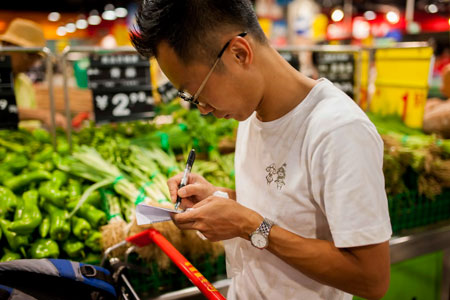Outside of Huilongguan subway station, Beijing, is a small shop called Mr Food that sells vegetables and meat. Many people who live in this most populous residential community stop by Mr Food to pickup groceries ordered online.
在北京,一出回龙观地铁站,就可以看到一家不大的蔬菜生鲜店,名为青年菜君。这个人口众多的社区里,有很多居民都会在此停留,提走他们在网上订好的菜。

Surprisingly, the shop’s founders are three 28-year-old sociology graduates from Renmin University of China. Instead of founding a business related to their major, they founded one that addresses a market need.
令人惊讶的是,这家店的创始人是三个28岁的年青人,他们都毕业于中国人民大学社会学专业。他们并没有选择与自己专业相关的领域创业,而是依照市场需求起家。
Career shift
职业生涯的转变
Ren Mu, one of Mr Food’s founders, has worked as a public relations specialist at a Beijing-based company before setting up the new business. As a PR consultant, he often rode the subway to and from work. After pulling himself from the crowd at Huilongguan station, he often felt lonely and exhausted, missing the feeling of home-cooked meals prepared by his mother.
青年菜君的创始人之一,任牧,在创业前曾在一家北京公司担任公共关系顾问。那时,他常常坐地铁上下班,每每当他挤出回龙观地铁站时,他总是感到孤单而又筋疲力尽,怀念妈妈在家做饭时的感觉。
“After moving from Shandong to Beijing, the only inconvenience I ever felt was when I was deciding what to have for dinner,” he said. He’d often eat at a small restaurant nearby, but the food often didn’t taste good and was unsanitary. So, he decided to start selling his own ingredients.
他说,“从山东来到北京之后,唯一的不方便就是我会常常发愁吃什么。”他常常在附近的小饭馆解决晚饭,但是那里的饭菜既不可口又不卫生。于是,任牧决定自己卖菜。
Researching success
好调查是成功的一半
He came up with the idea for this new startup after a lot of trial and error. “I made several startup attempts, but none of them worked because of a lack of market research,” he said. So when he discussed this business idea with his partners. They made market research their first step.
在形成最终创意之前,任牧也有过很多失败的尝试。他说,“我曾几次尝试创业,但都因为缺乏市场调研而失败了。”所以当他与几位合伙人讨论这次的想法时,他们首先进行了市场调查。
For an entire week, Ren went to Xinfadi, Beijing’s biggest wholesale market for meat and vegetables, on a daily basis. “I wrote down the price of dozens of vegetables, while my two partners took note of prices at supermarkets and vegetable vendors,” he said. They compared their findings in order to make sure they put their groceries at the right price point.
整整一个星期,任牧每天都去北京最大蔬菜生鲜批发市场——新发地,他说,“我负责记录(新发地)各种蔬菜的价格,而另外两个合伙人则负责记录超市和蔬菜小贩那里的价格。”他们比较各自的价格,最终确定他们商店的蔬菜价格。
“The profit margin when selling vegetables is about 100 percent. Make it simple, if a vegetable is sold at 1 yuan per 500 g at Xinfadi, then it can be sold at 2 yuan per 500 g in the supermarket, and 3 to 4 yuan at vegetable vendors in residential areas,” he said.
任牧说,“买菜的利润率差不多100%,简单而言,就是如果某样蔬菜在新发地卖1块钱一斤,那么它在超市就可以买到2块钱,在社区蔬菜小贩那里就要卖3到4块钱。”
Targeted service
针对性服务
However, Ren and his partners faced another challenge — how they could compete with other vegetable vendors. They took aim at office workers, who want to eat healthy food yet have little time to actually cook.
但是,任牧与他的合伙人还要面对另一个挑战:如何胜过其他蔬菜商?他们将目标锁定在白领身上,这些人希望吃得健康却没有时间下厨。
“We do all the preparation for them, cutting vegetables and meat to ready-to-cook form,” Ren said. “If they don’t know how to cook and what to put in the dish, we even have packed vegetables and meat for certain dishes.”
任牧说,“于是,我们就为他们做好所有的准备,包括切菜切肉,让食材能立刻下锅。如果他们不会做饭,不知道某道菜要放些什么,我们甚至会根据特定的菜肴为他打包蔬菜和肉。”
Now with a concrete business idea and solid market research under their belt, Ren and his partners opened their first store in March and second chain store in April. In total, they have attracted thousands of frequent customers and over 10 million yuan from angel investors.
在扎实的市场调研并形成具体的创业方案之后,今年3月,他们的第一家店开业,4月,他们的第二家连锁店也开业了。他们不仅吸引了成千上万的老顾客,而且还获得了天使投资1000万的投资。













